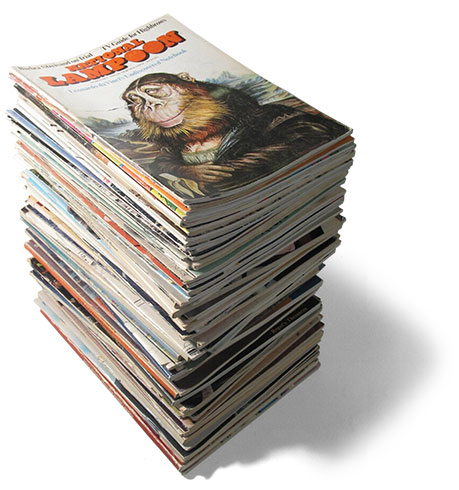According to Levine Breaking News, National Lampoon is going to be producing its own films again. For the last twenty-odd years, films with the “Lampoon” name have been connected with the company in name only, through licensing deals, so this is a new thing. Best of luck, guys! (And thanks for the tip, Chris.) Update: No idea whatever happened with this, but the link with the info is dead.

NatLamp Revival Plan
June 27, 2007 | Permalink | Comments: None »
1978 Animal House Book Reissued
June 19, 2007 | Permalink | Comments: None »
This is a new edition of the illustrated novelization of the movie that National Lampoon published as a special issue when Animal House was released. Chris Miller has more info about the new edition on his site. You can get the book from Amazon. Update: You can still get the book, but that “info” link to Chris’s site is gone.
Another Chris Miller Story Online
June 19, 2007 | Permalink | Comments: None »
“I Remember Mama.” This is the story that some say inspired the movie “Back to the Future.” Update: Don’t bother. The site doesn’t exist anymore.
Chris Miller Update
May 5, 2007 | Permalink | Comments: None »
Chris has been putting the full text of some of his classic National Lampoon short stories on his website. If you don’t have access to back issues of the magazine, check it out. The list so far includes “Pipe Dream,” “Caked Joy Rag,” and “The Toilet Papers.” Update: Well, so much for that. Chris seems to have pulled the plug on his site. Too bad.
Anne Beatts Interview on Jesse Thorn’s Blog
April 16, 2007 | Permalink | Comments: None »
Jesse Thorn, host of the radio show “The Sound of Young America,” has posted two video excerpts of his interview with Anne Beatts, former National Lampoon editor and writer. (Part one and part two.) Jesse says he will post the full audio of the interview on his site in a week or two. Great stuff.
Chris Miller Posts Memoir
March 23, 2007 | Permalink | Comments: None »
Chris Miller has posted a memoir on his website about what it was like during the filming of Animal House. Recommended reading. Update: Except you can’t anymore. Chris’s website is no more.
P.J. O’Rourke on NPR’s Talk of the Nation
January 8, 2007 | Permalink | Comments: None »
P.J. O’Rourke also appeared today on NPR’s Talk of the Nation to talk about his new book about Adam Smith. If you missed it, no problem. You can listen to it for free on NPR’s website after 6:00 p.m. EST. (Thanks again to Chris for the tip.)
P.J. O’Rourke on C-SPAN II
December 29, 2006 | Permalink | Comments: None »
P.J. O’Rourke is scheduled to appear for three hours live on C-SPAN II, the public affairs cable channel, on January 7, 2007 at noon CST. (Start time not verified.) (Thanks to Chris for the tip.)
Chris Miller Interview on MrSkin.com
December 29, 2006 | Permalink | Comments: None »
There’s another Chris Miller interview over at MrSkin.com, a website devoted to nudity in films. Not a lot of overlap with the interview Chris did with me here, which is good.
Josh Karp on Young America
December 4, 2006 | Permalink | Comments: None »
An even better and lengthier interview with Josh Karp than the one on NPR can be heard on The Sound of Young America radio show website. It originally aired on November 17. Don’t miss the “bonus audio”—eight extra minutes that were cut from the broadcast (presumably) because it ran too long. Update: The recording appears to have been removed.
Mark's Very Large Plug. You might think, as you wade through this site, that I have no life. Not true. I spend about two days a year working on Mark's Very Large National Lampoon Site. The rest of the time I make fonts. You can see my real website here. I also have an “art” website where I post caricatures and other stuff. For Lampoon-related stuff and site updates, follow me on X (Twitter). Also, check out my YouTube channel, where I post videos related to National Lampoon.
Original material (excluding quoted material) © 1997-2024 Mark Simonson.
Mark's Very Large National Lampoon Site is not affiliated with National Lampoon or National Lampoon Inc.
Click here for the real thing.
